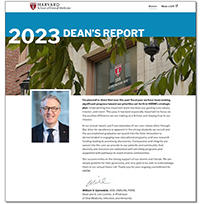
For immigrants who have just arrived in Boston, a critical oral health concern may be one of the first issues that leads them to seek care within the U.S. healthcare system. Navigating their options for dental care can be extremely difficult for many refugee families with language barriers and cultural differences. Nearly 7,500 immigrant households live in shelters or hotel rooms throughout Massachusetts’ shelter system, compounding the growing need for care.
“I was struck by the number of individuals and families, as well as the depth of the barriers they’ve experienced getting to any sort of medical or dental clinic,” said Alec Eidelman, a faculty member in the Department of Oral Health Policy and Epidemiology at Harvard School of Dental Medicine (HSDM).
On a recent chilly day in January, families lined up at a shelter in Everett to receive oral health screenings, advice, and oral care supplies from Eidelman and third-year pre-doctoral student Narjes Bencheikh. The fledgling program is one that has recently got off the ground after over a year of planning and legwork by Eidelman, Bencheikh, and shelter volunteers.

“We know that they will ultimately have dental needs that need to be treated, it’s just a matter of how and when. How can we get them connected with dentists for future check-ups? What needs to be treated right away?” he said.
As one of Eidelman’s students, Bencheikh became interested in ways she could help. A child of Moroccan immigrants, she was drawn to help vulnerable individuals at a young age. She volunteered at a local dental clinic in Northern Virginia, where she witnessed firsthand the impact dental care can have on a patient in need. She received a master’s in public health before applying to HSDM for dental school.
 “Through my studies, I delved into the intricate interplay among social, cultural, and environmental factors and their impact on health. I uncovered racial and ethnic disparities in dental service utilization, along with persistent barriers to equitable care access, including poverty, unemployment, and transportation limitations,” said Bencheikh. “Recognizing the significant potential to address these disparities and promote oral healthcare equity, I became deeply committed to the field of dental public health.”
“Through my studies, I delved into the intricate interplay among social, cultural, and environmental factors and their impact on health. I uncovered racial and ethnic disparities in dental service utilization, along with persistent barriers to equitable care access, including poverty, unemployment, and transportation limitations,” said Bencheikh. “Recognizing the significant potential to address these disparities and promote oral healthcare equity, I became deeply committed to the field of dental public health.”
Eidelman and Bencheikh began exploring literature around refugee oral health and quickly realized that there are very few examples of how programs were built locally.
“After reaching out to some international connections, we were provided with some basic guidance and support on how we might be able to begin assembling offerings here locally,” said Eidelman.
 During their first oral health outreach event in Everett, Eidelman and Bencheikh spent the morning working alongside community health workers in talking to refugees about their dental needs, checking for oral health issues they may need to address right away, and providing education on how to brush and floss correctly. They also collected contact and insurance information with the community health workers to connect individuals and families in need with eligible oral health services in the community.
During their first oral health outreach event in Everett, Eidelman and Bencheikh spent the morning working alongside community health workers in talking to refugees about their dental needs, checking for oral health issues they may need to address right away, and providing education on how to brush and floss correctly. They also collected contact and insurance information with the community health workers to connect individuals and families in need with eligible oral health services in the community.
Michelet Beauge, a shelter resident from Haiti, came to get an oral health screening and to receive basic dental supplies including floss, toothpaste, and a toothbrush. “It has always been important for me to get my teeth looked at. I’m excited to make this connection with a dentist and have this experience.”
Seeing the overwhelming success of the one-day event, both Eidelman and Bencheikh are looking forward to hosting more oral health outreach days like the one in Everett in the future.
“It’s all about building trust with members of the community,” said Eidelman. “It’s exciting to be involved in work that feels needed and rewarding.”


